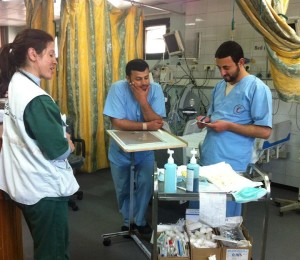 Sarah Woznick is a specialist intensive care nurse working with Médecins Sans Frontières (MSF/ Doctors Without Borders). She arrived in Gaza six months ago from Denver, Colorado. She was due to leave the mission the day after operation “Protective Edge” began, but decided to stay on to help provide medical care.
Sarah Woznick is a specialist intensive care nurse working with Médecins Sans Frontières (MSF/ Doctors Without Borders). She arrived in Gaza six months ago from Denver, Colorado. She was due to leave the mission the day after operation “Protective Edge” began, but decided to stay on to help provide medical care.
Image: Sarah in the intensive care unit of Nasser hospital, Gaza. Credit: MSF.
I was scheduled to leave Gaza the day after the military operation “Protective Edge” started. That first day there were lots of air strikes in our area. It’s a strange feeling when you realise that one is falling not far from you. Now I am a little more accustomed, but it still makes me jump from time to time. All of us think about our Palestinian colleagues. The MSF compound is a safe place, but their homes might not be, and we worry about them and their families.
Since the war started, I’ve been managing the postoperative clinic and preparing emergency pharmacy stocks that we are donating to local hospitals. So far we have been able to keep our clinic running with a basic team: a physiotherapist, nurse, and an admissions officer—all of whom live nearby. My role is mainly to supervise these activities, but on days when the clinic has been closed because the bombings have been too intense, some patients have been turning up at our office looking for medical treatment, and I have changed their dressings.
The most difficult dressings to do are those for small children; they do not understand what is going on, and they look at you wondering what you’re going to do to them. About 40% of the new cases we have seen since the war started have been children of 5 years or younger. I remember one 5 year old girl who had been burnt all down her back by hot water—something that we see often. The difference this time was that she was burnt because she ran into hot water when she was trying to run away from the shelling. She was crying and looked so scared—her parents were trying to console her. I wonder how she is now. Unfortunately, she has not been back to the clinic for her follow up treatment.
I remember another girl of 10 or 11 years old. She had an accident, spilling hot tea on her arm. She came to our clinic by herself. Nicolas, our field coordinator, asked if she was scared to walk along along the street by herself, and she replied, “You know, we’re all going to die one day.” I thought to myself that she was so much older than she should have been at that stage in her life. One of our Palestinian colleagues told me that his kids hide under the table as soon as they hear a blast. Another one said: “My kids grab onto me as if I could protect them, but actually, I can’t.” It must be incredibly difficult as a parent to feel that they can’t protect their kids.
Back home, I will definitely share my experience of Gaza. It will be very hard for me to leave, and the people here will be in my thoughts every day. Even after the current crisis is over, I’ll think about the friends that I’ve met who are living in a place where they are trapped in so many ways. I wish so many things for them—freedoms and choices they could have if they were not surrounded by walls.
Sarah Woznick is a specialist intensive care nurse for Médecins Sans Frontières (MSF/ Doctors Without Borders).
